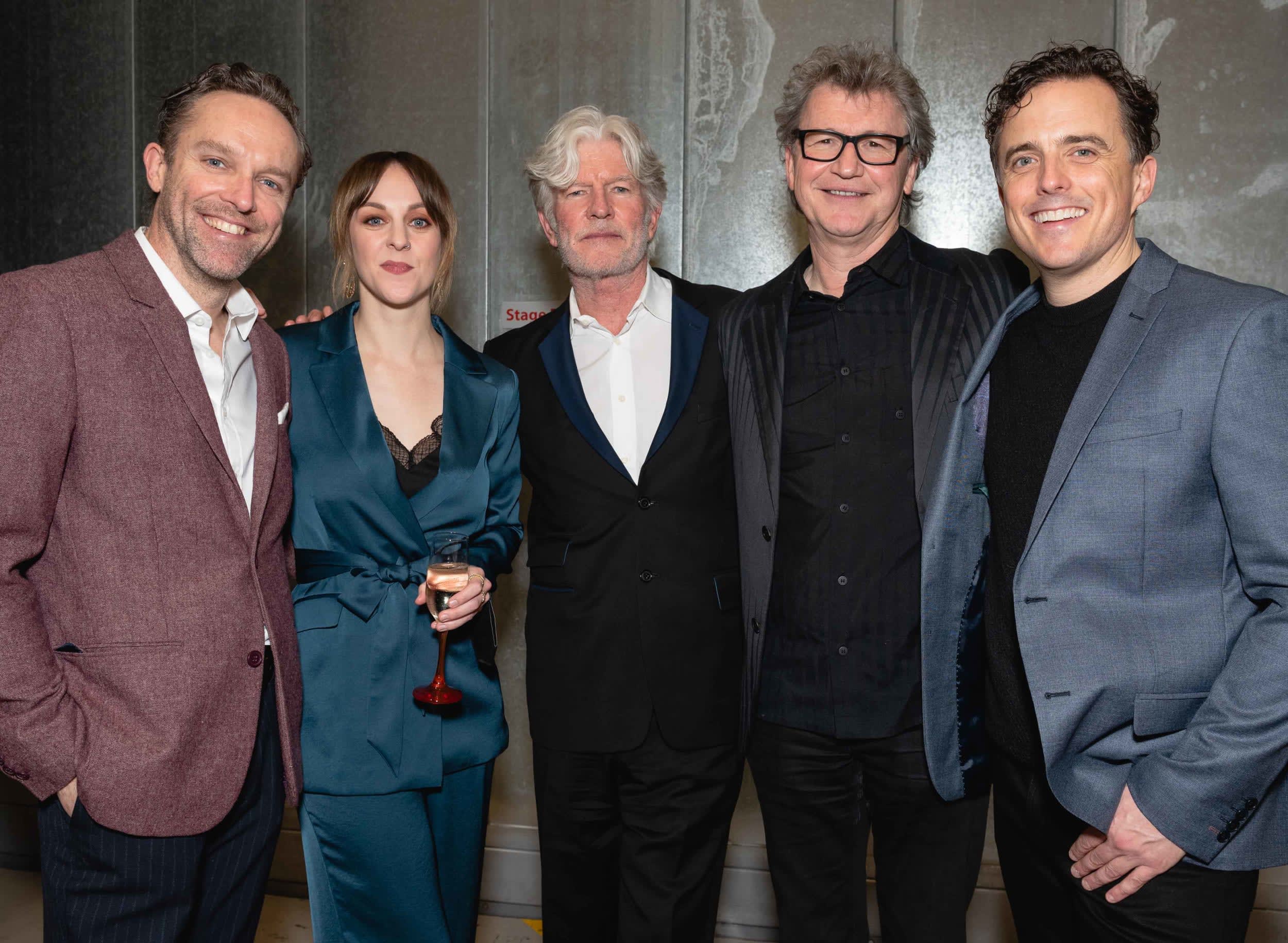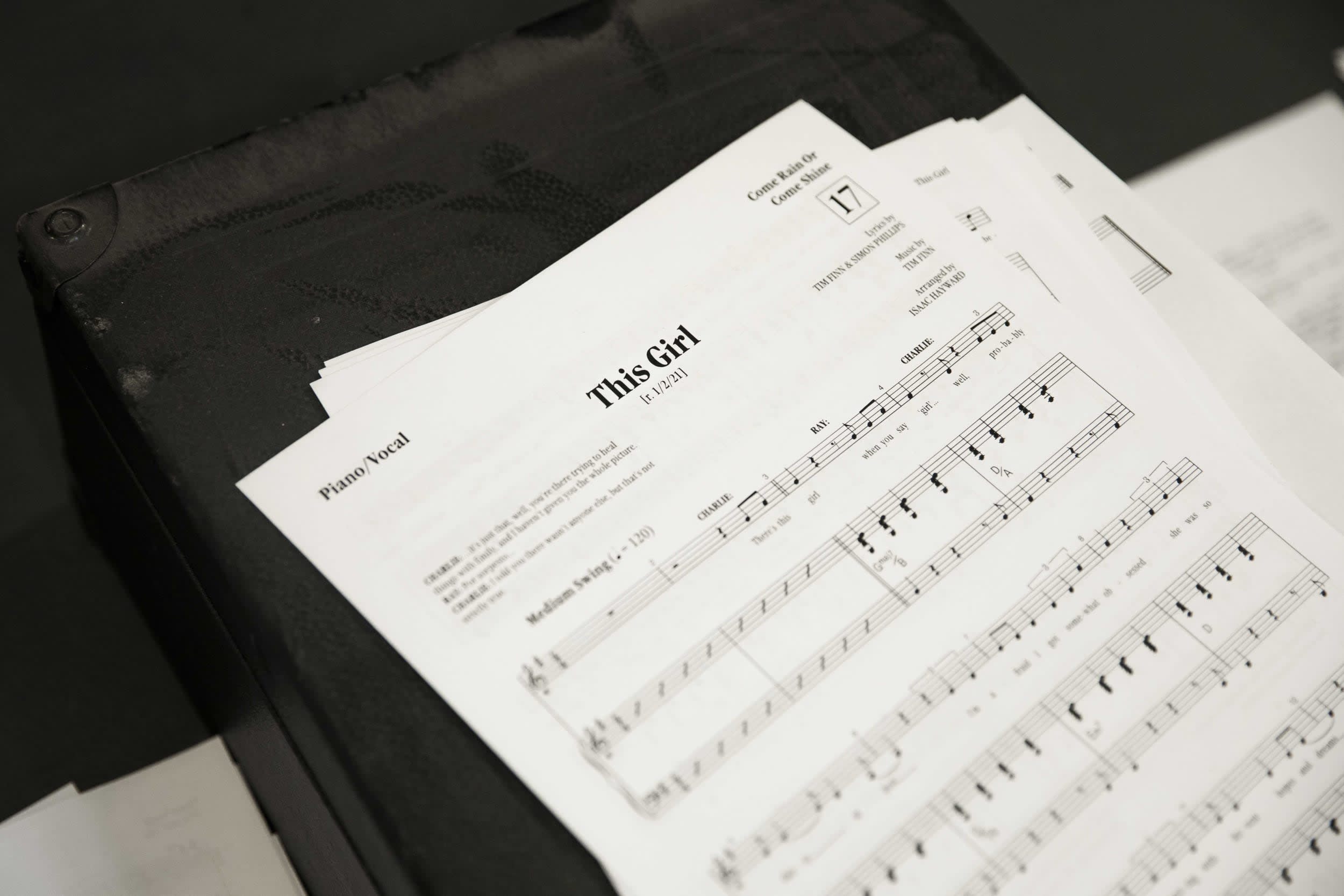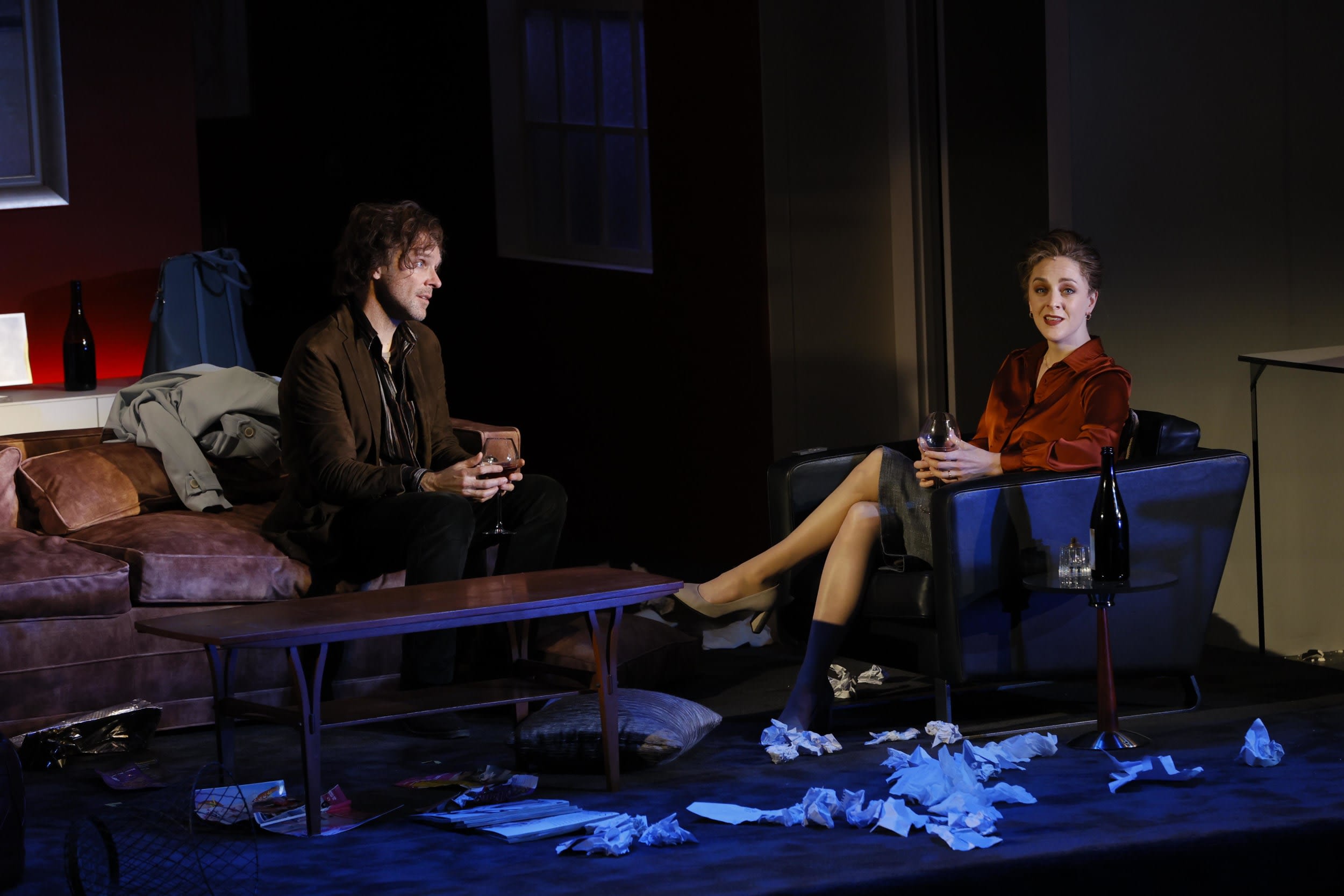Since the 1970s, Tim Finn has penned some of the most treasured songs in contemporary music, and is perhaps best known as a member of the bands Split Enz and Crowded House. What was it then that attracted him to composing songs for musical theatre?
‘I thought, all I want to do for the rest of my life is write songs that make people laugh. It’s amazing.’ Tim Finn is reflecting on the first preview of Ladies in Black, the award-winning musical he created with Simon Phillips and Carolyn Burns in 2016. To be exact, he’s recalling the moment the audience erupted into laughter when they heard his song ‘He’s a Bastard’. ‘Two weeks before we opened, I was going to drop it. But Simon said, “No, leave it in there, it’ll be great.”’ Six years later and Finn’s back making audiences laugh once again, this time with his original music for Come Rain or Come Shine.

Angus Grant, Gillian Cosgriff, Tim Finn, Simon Phillips and Chris Ryan at the opening night of Come Rain or Come Shine. Photo: Heath Warwick
‘It’s very liberating,’ Finn says about writing songs for musical theatre. Curiously, however, he attributes this to their parameters. ‘The song has to pull the story along and tell us about character, it has certain jobs to do.’ It’s very different to writing the type of songs he has built a career from. For those, Finn says, you draw from your own life, ‘you just feel something on a certain day, a memory or something that has happened,’ and you write from there. But for theatre you are inhabiting another person’s life and story. ‘That’s why I find it so liberating, I can just sort of forget about me and go into that story.’
Enter Come Rain or Come Shine – Kazuo Ishiguro’s short story that Finn has been immersed in for the past two years. ‘I read this lovely story and it seemed to have clues and signposts all throughout it,’ he says. ‘Ishiguro loves music, he was a songwriter and he still writes lyrics for songs. And he curated the list of classic songs so carefully and brilliantly throughout the story … music permeates the entire thing, it was just irresistible to me.’ Finn sent the story to Phillips and Burns and the band was back together, so to speak.
Taking shape
Though this is just their second offering since Ladies in Black, the trio have the process down pat. ‘We’ve learned each other,’ Finn says, ‘What I generally do is streak out ahead, writing songs that respond to the text, and Carolyn will start working on the script, and Simon’s very much a part of that process.’ By the time the script really starts to take shape, Finn already has a whole bunch of tunes up his sleeve. Next up is the lyrics and this time Finn and Phillips are writing them together. ‘I love writing with Simon. We collaborate very well on lyrics.’

Original music for Come Rain or Come Shine. Photo: Charlie Kinross
Finn also works very closely with Isaac Hayward, the show’s Orchestrator, Music Supervisor and Sound Designer. ‘We both agreed straightaway that the clarinet would be a great sound, because it can be slightly menacing, but it’s also slightly comical,’ Finn says. The clarinet is joined by the piano, bass and drums – the ‘obvious’ choices according to Finn. ‘We knew we had to keep the band really small, but within those four things, there’s a lot of colour.’ Finn credits this to the way Hayward writes the orchestration for each instrument – ‘it’s got a chamber quality, there’s a voice and space for each sound. They’re not just playing along with each other, they’re all playing the song in their own way, but it works beautifully together.’
Divine inspiration
It could also be said that the Great American Songbook classics that Ishiguro’s characters Emily and Ray love so much are Finn’s unofficial collaborators. ‘There's this whole world of jazz and classic songwriting that sort of underpins everything,’ he says, which helped him not only get into the world of the story but to immerse himself in each song’s distinct ‘mood or feeling.’ The classic music also transported Finn back to his own memories from childhood. ‘Our dad loves that music from the 30s and 40s. He would put a record on and close the door and we’d hear a lot of those songs coming through the walls. It was really nice to revisit that whole period of my childhood, a reunion with that kind of music.’
The influence of these timeless melodies becomes even more apparent when Finn starts describing a song he wrote for the end of the show, called ‘Gatecrashers’. Of course, the initial inspiration came from Ishiguro’s words. ‘He writes about the woman in the story, Emily, who wants to keep her marriage going, but it’s in real trouble. She talks about how you’re at a party with someone you love and you’re happy with them. But then there’s all these people off to the side going, “Oh, look over here. You can do better than that” and she calls them gatecrashers. And I thought that was such a great phrase.’ And then he discovered the song Ishiguro placed in the story: ‘April in Paris’ by Sarah Vaughan. ‘I’d never heard that song and was just mesmerised.’ Originally they had planned to have Vaughan’s track in the show, fading out and in around Finn’s ‘Gatecrashes’. ‘It didn’t quite end up that way,’ Finn says, ‘but it was a really amazing chance for me to get fully in the mood of “April in Paris”.’

Angus Grant and Gillian Cosgriff performing the song 'Gatecrashers' in Come Rain or Come Shine. Photo: Jeff Busby
Did composing originals that were destined to reside together with excerpts of these enduring standards ever daunt Finn? He admits that ‘writing songs that would hopefully coexist alongside those songs was challenging,’ but ultimately ‘it was inspiring.’ And once the team received Ishiguro’s seal of approval he never looked back. ‘We sent him the script with all the lyrics in there and he sent us back a really amazing email about how much he loved it,’ Finn smiles. ‘It was an amazing feeling to have a great writer and a master storyteller say that he was blown away by our script, really amazing.’
Come Rain or Come Shine is on stage until 23 July at Southbank Theatre.
Published on 1 July 2022
